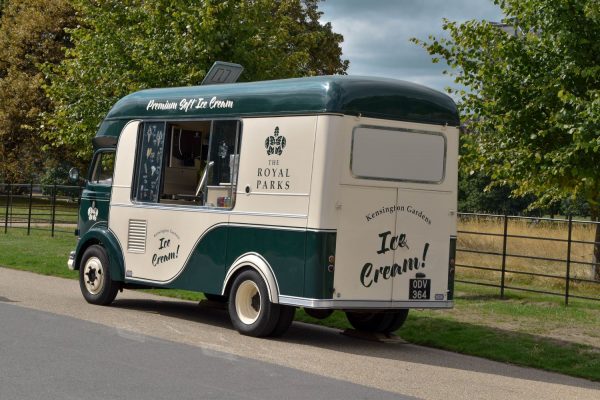How to set up an ice cream van business

Have you always dreamed of running an ice cream van business? In this guide, we walk you through all the steps you need to set up an ice cream van business, including the costs involved, the licences you need, and your potential earnings.
What to consider before you start your ice cream van business
Before you start your business, it’s important to consider the following questions:
Will you sell at events or on the street?
Are you going to buy your van new or used?
Will you choose a van or trailer?
Do you have all the documents and licences you need in order to operate?
What kind of ice cream do you want to sell?
Will you sell any other products?
Are you planning on opening a franchise or going it alone?
Are there any ice cream van rules and regulations?
Image source: Gavin Allanwood via Unsplash
In order to operate an ice cream van, you need to make sure you have the right licences and permits.
Register your business with the local council
For starters, you’ll need to register your business with your local authority. The request cannot be refused, but you’ll need to do this ahead of selling from your ice cream van – the government website suggests you apply at least 28 days before you want to start operating.
Note that when you register, your business might be inspected by the local authority, who will give you a food hygiene rating. As a result, it’s important to familiarise yourself with food handling best practices beforehand. You can take a free course on food safety online.
Check you have the right permissions

Image source: Florencia Viadana via Unsplash
Consider where you’ll be making the ice cream and how you’ll be storing it. If you’re just starting out and you want to make your product in your house, you’ll need to make sure you’re allowed to run a business from home.
Register as self-employed
You’ll need to register as self-employed if you’re running the business yourself. By doing so, you’ll have to self-assess your tax each year depending on your business’s earnings and outgoings.
Apply for food premises approval
Businesses that handle egg or dairy products need to apply for food premises approval. It’s likely that your local council will send someone to check your food truck to ensure that it can safely store these ingredients at the correct temperature. When you get approval, your local authority will let you know how to display your licence.

Image source: Courtney Cook via Unsplash
You can apply for food premises approval in England, Scotland, Northern Ireland and Wales through the government website.
Apply for a street trading licence
You’ll need a street trading licence if you want to trade in the street in England and Wales. Note that if you’ve already got a pedlar’s certificate, you might not need a licence for street trading, but you should still apply to find out.
In your application, you’ll have to tell your local council where and when you want to trade. The council could refuse your application or allow you to trade on fewer days than you asked for.
Note that you might have to pay a fee to get a street trading licence, though this will depend on where you plan to trade. For instance, if you want to trade in Newham, you’ll have to pay £75 for the application and then £25 each week the licence runs. You can pay in monthly instalments if you’re facing a large sum.
Consider getting advice from your local council

Image source: Vincent Creton via Unsplash
You local council and the government website will have a range of resources available for those who are just starting a business. Consider reading through their guidance and reaching out to them if you need any advice.
Make a HACCP food plan
In order to serve food, you’ll need to prepare a thorough Hazard Analysis and Critical Control Point (HACCP) food plan. This is to keep your food safe from biological, chemical and physical hazards. Your plan will need to:
Identify any hazards that should be avoided, removed or reduced
Identify the Critical Control Points (CCPs), i.e. when you need to avoid, remove or reduce a hazard in your work process
Monitor the CCPs and make sure to set limits for them
Put checks in place to ensure the plan is working
Keep records
The government provides guidance for creating an HACCP plan if you need help getting started.
Risk assessment

Image source: Filip Šablatura via Unsplash
If you’re employing other members of staff, make sure you perform a risk assessment to control any risks in the workplace. You can find out more about assessing risks through the Health and Safety Executive website, the national regulator for workplace health and safety in Britain.
Make sure you know the rules around ice cream van chimes
In 2013, new rules around ice cream van chimes came into effect, so it’s important that you know these before you start operating and before you install the chime on your van.

Image source: Lindsay Moe via Unsplash
Rules include:
The loudspeaker should only be operating between noon and 7pm on the same day
The chime can’t be louder than 80dB
When operating in residential areas, it might be necessary to reduce the volume below 80dB
The chime can only sound for 12 seconds or less
The chimes can only be used once when the van is stationary, and never at intervals of less than 2 minutes
Chimes should be played once only on the approach to each stopping place (or ‘selling point’)
The chimes should be played no more than once every two hours in a particular length of street
Chimes should not be played when in sight of another van (whether moving or stationary) that could reasonably be on the street for trading purposes
The chimes should be played only as often as necessary to let customers know that the product is being sold from the vehicle
Chimes should not be played in areas where people may be especially sensitive to their sound. In particular they should not be played within 50 metres of:
any hospital or similar institution
a school during school hours
a place of worship on a Sunday or other recognised day of worship
Choose between opening a franchise or running your own business

Image source: Colin White via Unsplash
There are a number of ice cream franchises that operate in the UK which you can join. This often has lower barriers to entry when compared to starting your own ice cream truck, but you’ll be selling another company’s ice cream. This isn’t ideal for all prospective ice cream van business owners, especially if you’re considering opening an ice cream van because you want to sell your own handmade ice cream.
You’ll also need to consider the costs involved with both options; although running a franchise often come with considerable start-up costs, such as the franchise fee, you might find that selling ice cream is easier if you run a franchise under a well-known brand and you don’t have to spend as much on advertising.

Image source: David Bayliss via Unsplash
The franchise might also have a number of pitches in your area of operation. Given that many consider finding a pitch one of the most challenging aspects of starting an ice cream van business, this could help your business run more smoothly. That being said, you might still have to pay recurring franchise royalties each month, but this will depend on the contract.
How to choose your ice cream truck: buying new, used, or converting a van yourself
Choosing an ice cream van can be difficult as it comes with a range of options, including whether you should buy an ice cream van that’s already been fitted with all the equipment you need to run your business, or whether you want to buy a brand new van that you can customise to your liking yourself.

Image source: Jill Dimond via Unsplash
On the one hand, buying an ice cream van that’s already been outfitted with the right equipment can help you get up and running quicker, but on the other hand, doing so gives you less flexibility on your equipment and the truck’s layout.
Buying an ice cream van that’s already been fitted with equipment can cost between £5,000 and £13,000, but getting a custom ice cream van made can be considerably more expensive depending on what you want, with prices ranging from £3,000 to £39,000. Even if you have the technical know-how to convert a van into an ice cream truck yourself, this will take a considerable amount of time and money, and there is a risk that you could do something wrong.
You might even consider buying a vintage ice cream truck as this can help you stand out from the competition!
Finding a pitch

Image source: Samuel Regan-Asante via Unsplash
In many areas, you can’t simply park up and start selling. Often, you’ll have to find a pitch where you can legally sell your wares. Finding a pitch is often one of the hardest things you can do as an ice cream truck business owner, and you might find that the best spots will go quickly on sunny days. Thankfully, there are a number of websites you can register with, such as Retail Concessions, in order to find pitches to sell your ice cream.
You can also buy your own pitch online, and if you’re buying a used truck, you might also find that a pitch is included in the sale of the van.
If you’re struggling to find a pitch, you might have to think outside the box and potentially consider selling at events, such as weddings and festivals.
What are the costs involved with starting an ice cream truck business?

Image source: Kai Bossom via Unsplash
There are a number of costs involved with starting and running an ice cream truck business. This includes:
the cost of the van itself and necessary equipment
licencing fees
the costs involved with buying or renting a pitch
franchise fees if you’re setting up a franchise
the cost of ingredients
containers and utensils for customers
ice cream van insurance
petrol
MOTs
wages and salaries for staff (and yourself!)
How much do ice cream vans make in the UK?

Image source: Clem Onojeghuo via Unsplash
Ice cream vans are one of the most lucrative food truck businesses you can run in the UK, but the strict rules and seasonality of products can really limit profits.
Although ice cream vans can sell as many as 400-600 ice creams in a day when it’s sunny, colder days can be extremely slow, so you’ll have to bear this in mind. In spite of this, as running costs are fairly low for an ice cream van, this could prove quite a lucrative business, even when you take into account slower days.
How much you’re able to make really depends on a wide range of factors, including the weather in your area, where you run your business, what kinds of products you sell, and more.
On days where the weather isn’t as good, it might be a good idea to branch into different areas of the ice cream business, such as selling at corporate events and wedding receptions. You could even consider adding other products to your roster, such as sweets, crisps and drinks.

Image source: Scott Evans via Unsplash
Make sure you consider running costs like ice cream van insurance
When you’re running your own business, there are a number of running costs that you might have overlooked, including the cost of MOTs, fuel and van insurance. Thankfully, as a specialist insurance broker, we’re able to source affordable ice cream van insurance where other insurance companies cannot. Call us for a quote on 0800 081 0777 or request a callback at a time that suits you.







